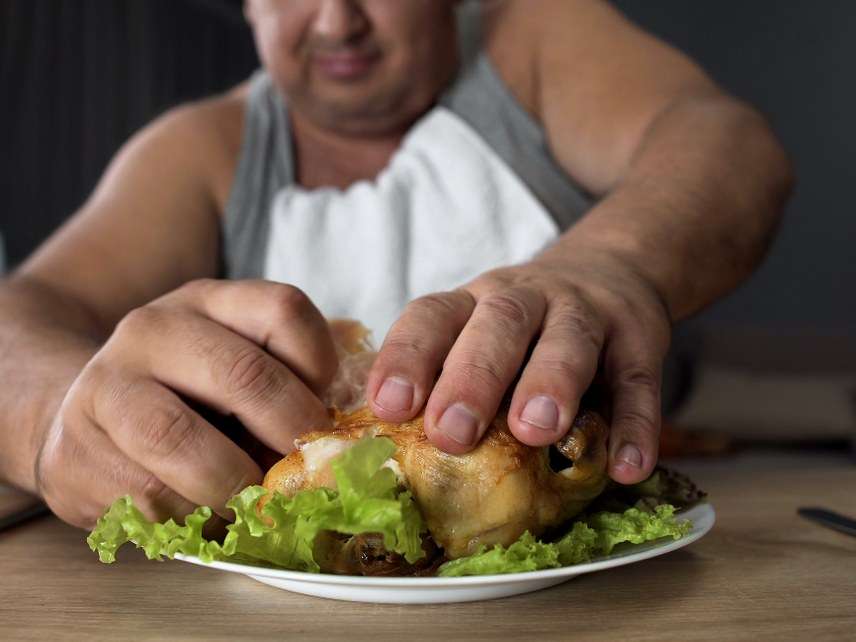British Food Nannies Want to Slap That Burger Right Out of Your Hand
In order to fight obesity, a U.K. health agency wants calorie caps on everything.

British citizens trying to craft a New Year's resolution for 2019 don't have to worry. Your government is taking care of it. You're going to commit to eating less food.
It doesn't matter whether you want to or even need to eat less food. Public Health England has decided that growing obesity numbers require all British citizens to eat less food. And they're going to force the matter by controlling the size of just about every single piece of food and prepared meal available for purchase.
This proposal has been brewing for a while (we made note of it in October), but over Christmas the full extent of the draft plan was leaked to The Telegraph. The plan is both very expansive, capping calories for every prepared food, including vegetables and salad dressings, and repressive, setting limits at around 550 calories for lunches and a weirdly specific 951 calories for restaurant entrees.
The Telegraph notes that these calorie limits hit many prepared meals popular in England, including helpful lists of dishes that are well over the caps. Even a representative from the National Obesity Forum in England who generally supports calorie caps thinks the 550 number is too small and should be more like 800. Public Health England wants citizens to cap their calorie intake from meals at 1,600 per day, which is significantly less than most health experts recommend.
Christopher Snowdon of the Institute of Economic Affairs and the Adam Smith Institute has been blasting this whole plan, which seems comically impossible, but may lead to some dangerously incompetent outcomes. Public Health England says that it's going to be pushing for voluntary changes to reach these goals, but given how low caps are, it seems designed to fail. And then what happens? Snowden is certain that this is all going to become a lot less voluntary:
Some of the companies will attempt to play along, mainly by reducing portion sizes, but it is a doomed enterprise. The government initially threatened to use 'other levers', such as advertising restrictions, 'if progress isn't made', but it has already capitulated to the 'public health' lobby on this, so the only thing left is to threaten them with more taxes and mandatory calorie limits. Make no mistake, the industry is being blackmailed.
If mandatory limits are introduced, it will mean an effective prohibition on many of Britain's best loved dishes. Steak and kidney pudding far exceeds the 951 calorie limit for out-of-home food, as does ham, egg and chips, the all day breakfast, fish and chips, and beer and ale pie (based on Wetherspoons' nutritional information). So does a normal Christmas dinner.
As for foreign cuisine, you can kiss goodbye to kebabs, curries, pizzas and Chinese food. But it's a treat, you say! Tough luck. No exceptions.
Allow me to point out another flaw. You can just buy more food. Attempts by government to control human consumption by controlling portion sizes can (and does) backfire. In South Carolina, prohibitionists tried to control alcohol consumption by limiting the size of liquor bottles. The end result was that individual cocktails ended up having more liquor in them, not less, as bartenders poured the entire bottle into the drink.
It's not wrong to tell people who are overweight that they should eat less. (Disclosure: I used to be overweight myself, and learning to adjust portion sizes to appropriate levels was vital to losing and keeping off weight. But also exercise! And having realistic goals and expectations that don't include trying to starve yourself thin.) But this is the wrong way to do it, both on principle and in execution. A person who leads a very physically active life is more certainly not going to get enough to eat if he or she attempts to comply with what this organization thinks they're supposed to consume each day. A person who probably should eat less may end up eating way more, particularly if they resort to double orders in order to circumvent smaller portions.
It's an awful plan that probably won't accomplish its goals. And when it inevitably goes sideways, the government response will be to go back for seconds.


Show Comments (44)